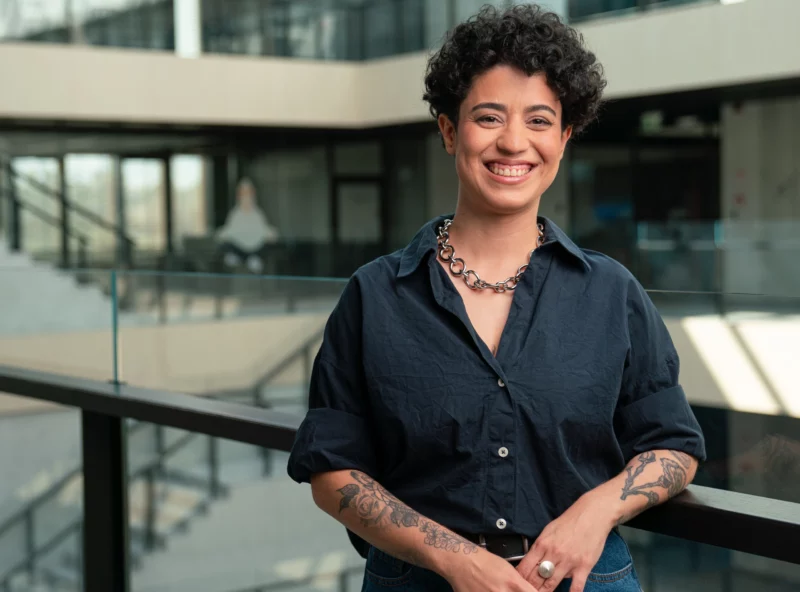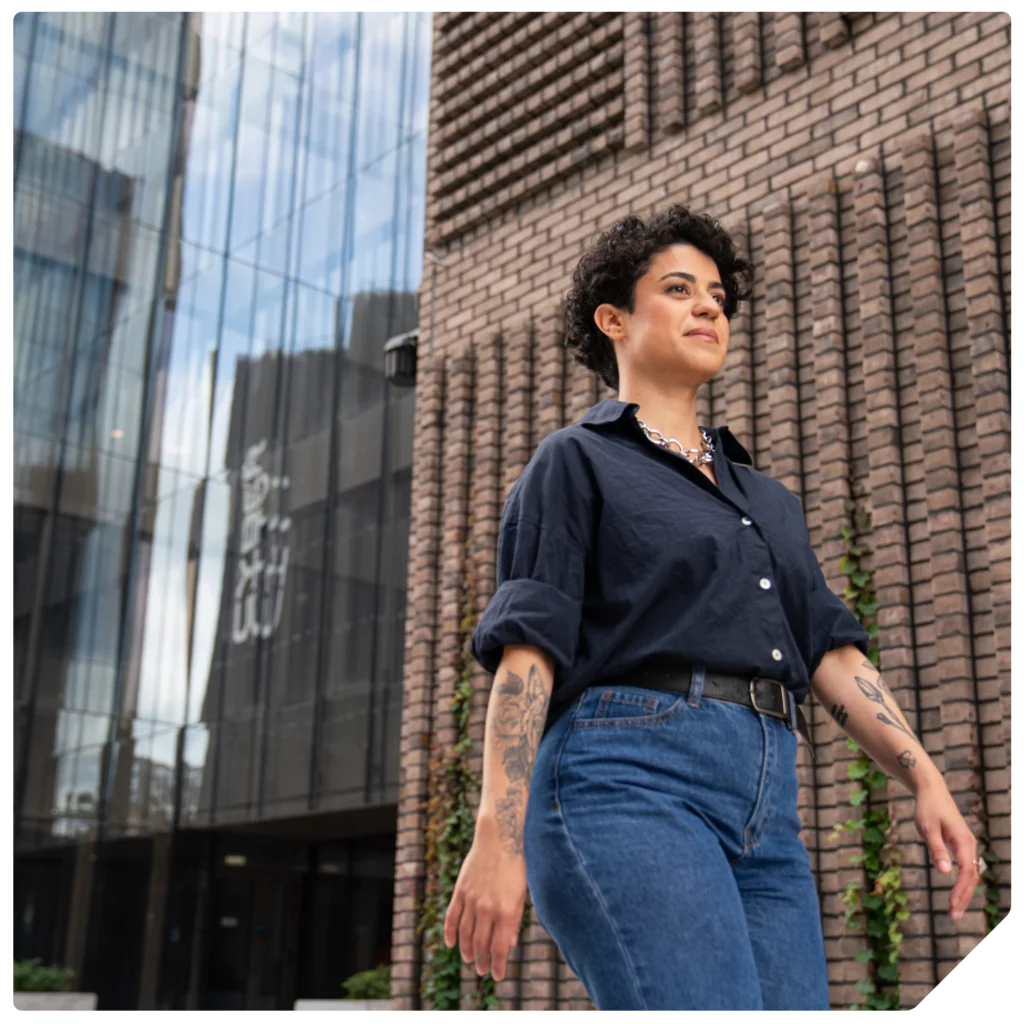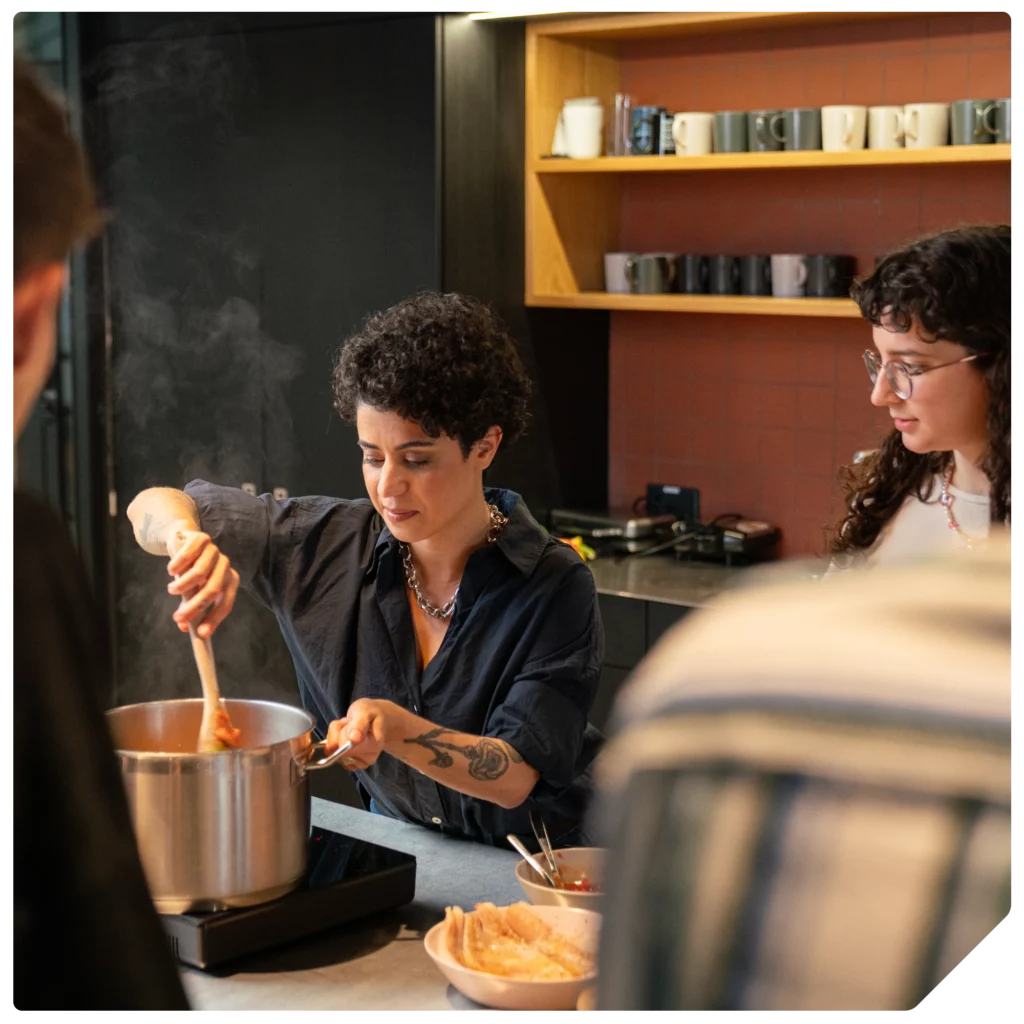- en
Madu Melo
After working in marketing for over a decade, travelling around the world, and running her own restaurant, Madu Melo is now the Country Manager for Brazil at the tech unicorn NordVPN in Vilnius. We sat down with Madu to discuss her move to Lithuania, the potential she sees here, and how delicious food helps one make friends.

One thing that I hear from other expats often is that Lithuanians are really reserved, and it’s hard to break their shells. I believe that people are trying to do that in the wrong way, because I never had this impression. Just give Lithuanians some food, and they will open up very easily!
Back in Brazil, you went from a marketing specialist to a restaurant owner. How did that happen?
Originally, I’m from the Northeast of Brazil, but I moved to São Paulo when I was 19. I started my marketing career there and worked in the field for around 13 years until I experienced burnout. I quit my job and travelled around the world for half a year. During this trip, I decided that I wanted to have my own business. One of the things I always loved was food—not just enjoying it, but also understanding the heritage and culture behind every dish. So, when I was thinking about what to do next, I had the idea to put this passion to work and open a restaurant that would showcase Brazilian heritage. I had never worked in this industry before, so I really had no clue what was ahead. I ended up running my restaurant for three years—some of the most challenging but rewarding years of my life.
When did you start thinking about moving to Europe? How did you narrow down your shortlist to Lithuania?
At the beginning of the pandemic, I met this crazy guy online—he’s now my husband. We chatted for several months; then, he came to stay with me in Brazil for a while. We later travelled to the Netherlands together, where he lived at the time. Back then, I wasn’t sure I wanted to move to the Netherlands permanently.
At that time, my restaurant was still open, and I was managing it remotely. But after a few months, we found out that I was pregnant. We had to decide where to stay and what would be best for our child. We decided to stay in Europe because it seemed like a better place to raise a child. Brazil is a great place with a lot of career opportunities, but when you’re preparing to raise a child, your priorities change.
I also told my husband that it would be best for us to live close to our family. Since we decided Brazil was not the right option, that left us with Lithuania, where my husband is from. That’s how we came here when I was seven or eight months pregnant. Next month, it’s going to be three years since I moved to Lithuania.

What research did you do into life and work in Lithuania before coming here?
I searched on LinkedIn and found that there were a lot of nice work opportunities here. I also joined Facebook groups for expats, where people were saying that the language is not a big barrier, that people will speak English with you, and even an older person, if you are polite and start a conversation even without speaking the local language, will try to be helpful. In Brazil, it’s different—data shows that only 1% of the Brazilian population speaks English. So it would be very hard for my husband to find a job there.
In general, from everything I read about the country and the many companies establishing their offices here, I could see how impressive Lithuania’s growth has been in a short period of time. I always say that Lithuania has had a very hard history, so if it has managed to grow that fast, there are only good things coming in the future. When people back in Brazil say that they want to move abroad and live in Europe, I always tell them to stop looking into Portugal and look into Lithuania instead. Every time that I talk about Lithuania, the opportunities here, and how fast the country is growing, people get very excited to come and check it out.
What was your first job in Lithuania?
When I arrived here, I was still pregnant, so I wasn’t looking for a job. But at the same time, I needed to do something. So my first ‘job’ here was private cooking. There were no Brazilian restaurants or chefs in Lithuania, so I just made a post on Facebook and started receiving loads of requests! I was doing cooking classes, and I also cooked for a food subscription service.
When my daughter turned 11 months old, I decided that I wanted to get back to the office and have a more stable income. It didn’t take long for me to find a job. I applied through LinkedIn to local and multinational companies and landed a job in two weeks. I started working at a small company called Pando Moto which develops motorcycle gear, where I stayed for half a year. Then I moved to NordVPN—they offered an opportunity to work with the Brazilian market, and Brazil is always on my mind. I knew nothing about NordVPN when I applied, but couldn’t pass up the opportunity to work with my country. It took a month to get the job, from the beginning of the process to the end, so again, it happened very fast. They also told me that they did not expect to find a Brazilian person with 15 years of marketing experience living in Vilnius!

So what does your job at NordVPN involve?
I’m responsible for marketing in the Brazilian and Mexican markets. My role is spread across various marketing channels. At Nord, all channels are overseen by heads of dedicated departments, but a Country Manager is someone who interacts with all of them, gives ideas, insights, and input from their country, and proposes ideas. I also need to get my hands dirty—for instance, I negotiate with a lot of YouTubers and affiliates in Brazil and Mexico. In general, my job is about representing Nord in the countries I work with, but also representing those countries at Nord.
What I like about working at NordVPN is that it’s a very collaborative company. There’s not a lot of top-down approach. And it’s very fast-paced—a lot of people here are very proactive and hands-on, so it feels different from working at a traditional company. It’s really cool, and I’m super happy to be working there.
What do you do after work? Did you find people in Lithuania who share your hobbies and interests?
When I started at Nord, I had to talk about Brazil at a Lithuanian company with international people and also get their attention in my market. And what’s the one thing that can steal anyone’s focus? Food! So I started bringing Brazilian meals to the marketing team at Nord. I would cook for 25 people for free! This then started to really grow inside the company, spreading to reach other teams as well. So now I cook once a quarter, and the event is open to the whole office—people need to simply register to get a free Brazilian lunch.
One thing that I hear from other expats often is that Lithuanians are really reserved, and it’s hard to break their shells. I believe that people are trying to do that in the wrong way, because I never had this impression. Just give Lithuanians some food, and they will open up very easily! Because of my initiative, I got to know a lot of people from different backgrounds and different teams, from IT to the legal department. We also set up this food club, where we share recipes, go to restaurants together, and so on.
NordVPN also has a significant expat community. But Lithuanians also often join our gatherings, and it’s very nice to hear everyone’s stories. In this community, we also gather once a month at someone’s house, and the host cooks traditional foods for us. The last host was actually Lithuanian, so we got to try true Lithuanian specialities. We also had Syrian, Turkish, and Taiwanese hosts. In August, we’re also planning a weekend away with this community. So if I didn’t have a kid, my social life would actually be very intense! Because of my daughter, I have to skip the gatherings sometimes.

So do you think that Lithuanians not engaging with foreigners is a myth?
Absolutely. Recently I spoke to someone who moved to Lithuania a couple of weeks ago, and they said, ‘Oh, it’s very hard to engage with Lithuanians, I don’t know how to act.’ And I said, ‘You act as yourself. Maybe they are reserved because you’re trying to be someone else?’ In Brazil, when I see someone, I give a hug to say hi. That’s natural for me and, honestly, something that I have no control over. I also do this in Lithuania, and I never had anyone lean back or say, ‘No, don’t enter my personal space.’ I’m also in the mental health group at Nord.
We have a Slack channel, and one day I wrote a message along the lines of, ‘Winter here is difficult for me. Please, if someone here wants to have a coffee with me, let me know.’ The requests came flooding in, and before I knew it, I was having coffee three times a week! Experiences like that have given me countless stories to share. It seems that most of us hesitate to show any vulnerability, but opening up creates space for deeper connections with others.
As a foodie, how do you like Lithuania’s culinary scene?
There are a lot of restaurants worth trying. And not only those that now have a Michelin star, although I was very excited when the news came out that Michelin is coming to Lithuania. I really like the local food scene because you are really proud of your culinary heritage and celebrate it when you have the chance. Take the Michelin star restaurants in Vilnius—I was really happy that stars were awarded to restaurants that use local producers or engage with the local community. I think you do this very well and other countries could learn from you.
The interview was conducted in September 2024.